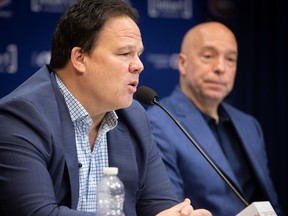Media
Americans Don’t Trust the Media Anymore. So Why Do They Trust the Cuomos? – The New York Times

At the end of 2013, CNN executives sent word to Chris Cuomo: No more interviewing your brother on television.
The CNN host had taken a little heat when he addressed his older brother, Andrew Cuomo, deferentially as “governor” in an interview about a train accident in New York. Can you really cover your brother fairly? critics asked on Twitter.
So for six years, Chris Cuomo sat by silently while the governor appeared on his morning show “New Day,” but was interviewed by other CNN personalities. The elder Mr. Cuomo used those occasions to mock his little brother so brutally that Jon Stewart made a montage of it. Andrew Cuomo at one point suggested that Chris Cuomo “go into a prison and maybe stay there for about a year or so and then do an exposé on prison life.”
All that changed on Wednesday, March 11. Andrew Cuomo had become too central to the coronavirus story to ignore, and Chris Cuomo’s bosses at CNN gave him the green light.
So in a series of four riveting interviews, Andrew Cuomo, 62, delivered the scary reality of the pandemic to his brother’s audience. He also bragged that he is their mother’s favorite and that Chris — Christopher, he calls him — was the family “meatball.” When the governor’s audio finally dropped, Chris delivered an aside: “This is a great chance for me to say some things to him.”
The Cuomo brothers’ show became a deeper drama last week when Chris Cuomo, 49, revealed his coronavirus diagnosis. He had lost 13 pounds in three days. He chipped a tooth one night when he was in terrible pain. On Thursday, he called into his brother’s daily news conference.
“You came to me in a dream, you had on a very interesting ballet outfit, and you were dancing in the dream, and you were waving a wand and saying, ‘I wish I could wave my wand and make this go away,’” Chris Cuomo told the governor.
The sick guy in his basement roasting his brother is not exactly high-minded journalism. Imagine the reaction, if, say, a Trump family member interviewed the president on Fox News. But it is moving television. And more than anything, it reflects the instincts and inclinations of Jeff Zucker, the morning show producer-turned-corporate executive who now runs CNN.
“It flies against every preconceived notion of normal CNN standards and practices,” Piers Morgan, the former CNN host who is now a co-presenter of “Good Morning Britain,” said in an interview.
“But,” Mr. Morgan added, “the corona governor talking to his victim brother is incredible to watch.”
#styln-briefing-block
font-family: nyt-franklin,helvetica,arial,sans-serif;
background-color: #F3F3F3;
padding: 20px;
margin: 0 auto;
border-radius: 5px;
color: #121212;
box-sizing: border-box;
width: calc(100% – 40px);
#styln-briefing-block a
color: #121212;
#styln-briefing-block a.briefing-block-link
color: #121212;
border-bottom: 1px solid #cccccc;
font-size: 0.9375rem;
line-height: 1.375rem;
#styln-briefing-block a.briefing-block-link:hover
border-bottom: none;
#styln-briefing-block .briefing-block-bullet::before
content: ‘•’;
margin-right: 7px;
color: #333;
font-size: 12px;
margin-left: -13px;
top: -2px;
position: relative;
#styln-briefing-block .briefing-block-bullet:not(:last-child)
margin-bottom: 0.75em;
#styln-briefing-block .briefing-block-header
font-weight: 700;
font-size: 16px;
margin-bottom: 16px;
#styln-briefing-block .briefing-block-header a
text-decoration: none;
color: #333;
#styln-briefing-block .briefing-block-footer
font-size: 14px;
margin-top: 1.25em;
#styln-briefing-block .briefing-block-briefinglinks
padding-top: 1em;
margin-top: 1.75em;
border-top: 1px solid #E2E2E3;
#styln-briefing-block .briefing-block-briefinglinks a
font-weight: bold;
margin-right: 6px;
#styln-briefing-block .briefing-block-footer a
border-bottom: 1px solid #ccc;
#styln-briefing-block .briefing-block-footer a:hover
border-bottom: 1px solid transparent;
#styln-briefing-block .briefing-block-header
border-bottom: none;
#styln-briefing-block .briefing-block-lb-items
display: grid;
grid-template-columns: auto 1fr;
grid-column-gap: 20px;
grid-row-gap: 15px;
line-height: 1.2;
#styln-briefing-block .briefing-block-update-time a
color: #999;
font-size: 12px;
#styln-briefing-block .briefing-block-update-time.active a
color: #D0021B;
#styln-briefing-block .briefing-block-footer-meta
display: flex;
justify-content: space-between;
align-items: center;
#styln-briefing-block .briefing-block-footer-ts
color: #999;
font-size: 11px;
@media only screen and (min-width: 600px)
#styln-briefing-block
padding: 30px;
width: calc(100% – 40px);
max-width: 600px;
#styln-briefing-block a.briefing-block-link
font-size: 1.0625rem;
line-height: 1.5rem;
#styln-briefing-block .briefing-block-bullet::before
content: ‘•’;
margin-right: 10px;
color: #333;
font-size: 12px;
margin-left: -15px;
top: -2px;
position: relative;
#styln-briefing-block .briefing-block-header
font-size: 17px;
#styln-briefing-block .briefing-block-update-time a
font-size: 13px;
@media only screen and (min-width: 1024px) {
#styln-briefing-block
width: 100%;
Both Cuomos declined to speak about their on-screen relationship. But on his SiriusXM radio show last Tuesday, the younger Cuomo acknowledged that, when interviewing the governor, he’s not an ordinary journalist questioning a public official. He’s offering insight into a man he is close to and hopes his audience can understand more deeply.
“I wanted people to see that he’s not just super-intense on this all the time — that he’s living it with you,” Chris Cuomo said. “He gets it. He’s not a general. He’s a man in full, and he’s worried.”
He acknowledged the obvious conflict of interest. “There will come a time when there’s an accountability measure where it will no longer make sense for it to be me” interviewing the governor, he said.
Even without the almost cinematic story line, the coronavirus moment seemed tailor-made for Chris Cuomo. He’s a high-wattage, emotional journeyman who arrived at CNN to revive its morning show in 2013.
His unpredictable, in-your-face style — on camera and off — didn’t always work in an ensemble. So in 2018, Mr. Zucker moved him to a 9 p.m. slot, opposite MSNBC’s Rachel Maddow and Sean Hannity of Fox News, two ideologically driven powerhouses who typically — and easily — bested CNN in the ratings.
For two years, Mr. Cuomo delivered a solid audience — it is CNN’s top-rated show — but never broke out. His mad-as-hell attacks on government failures lacked the explanatory clarity offered by Ms. Maddow and her MSNBC colleague Chris Hayes. His celebrity quality — taut T-shirts and bulging biceps bared during Hurricane Irma in 2017 and workout videos on Instagram — didn’t connect to the political moment. His most compelling viral moment occurred last year, when he erupted angrily at a guy who called him “Fredo” at a bar on Shelter Island.
But the new crisis plays to his strengths. It is about Mr. Cuomo’s go-to topic: government failure. Audiences are eager for accountability and information. But they are also responding to love, Noah Oppenheim, the president of NBC News who keeps an eye on the competition, said in an interview. “Love between people — whether it’s brothers in high-profile positions, or doctors and patients.”
That is one thing the Cuomos do: They love one another. On March 30, the day a Navy hospital ship arrived in New York, they said “I love you” twice each, in quick succession.
The affection, the combat — this is, friends say, how they are. “I was a little shocked at how open they’re being about this but people seem to really enjoy it,” said a close friend of Chris Cuomo’s, Chris Vlasto, an ABC News executive producer. (I’ve noticed that I’m quoting a lot of men in this column; the Cuomos’ world is very male.)
The boys and their three sisters grew up at the feet of Gov. Mario Cuomo, who served as a counterpoint in the 1980s to the Republican president, Ronald Reagan. Mario Cuomo was the intellectual keeper of the Democratic flame, much as his elder son provides Democrats with their clearest contrast to President Trump today.
The governor was a demanding father who bred intense competitiveness among his children. Andrew was a gear head and his father’s right hand; Chris was the pudgy youngest of five, who worshiped his big brother. “The relationship between Andrew and Chris when they were younger was much more a father and son type relationship,” said John Marino, an aide to Mario Cuomo, who recalled driving to New Jersey with Andrew days before the 1986 New York election to check out a used sports car that Chris wanted. “Mario was governor, he was busy, and Andrew remained very, very close to Chris.”
Their relationship has stayed close, and complex. Andrew is a solitary figure, Chris is an extrovert. Andrew is a behind-the-scenes player, Chris is a performer.
Chris has also been an adviser to his brother, people who have worked for Andrew told me, sometimes extending his advice to the governor’s staff. He’s encouraged his brother’s boldness; he has also encouraged the governor’s prickliness about media coverage, a shared “Cuomo gene,” one friend said.
And now, suddenly, “my brother is this fulcrum point of where we are, and what’s going on, and now all of you are watching CNN for perspective on this and I’m right in the middle of it,” Chris Cuomo said on his radio show. “And now I have coronavirus. So weird.”
He added: “The fact that you think Andrew is sexy is so weird to me.”
CNN’s audience more than doubled from March 9 to April 2, according to Nielsen, outpacing its rivals in audience growth. “Cuomo Prime Time” is up even more, 118 percent. The most-read story on CNN’s website on Thursday — even as news broke that 6.6 million people had filed unemployment claims — was about Mr. Cuomo’s personal battle with the virus.
It’s easy, in this strange moment, to forget how far even outside the stretched norms of television news this is.
But the critics have started to raise eyebrows. The Washington Post’s media columnist, Margaret Sullivan, asked Saturday whether the “journalism ethics police” shouldn’t shut down the whole thing.
Fabian Reinbold, a German foreign correspondent based in Washington, was also puzzled.
“It would be considered highly inappropriate and corrupt back home, but here it is getting applause on Twitter by a lot of colleagues,” Mr. Reinbold said. “Needless to say, there are plenty of such problems in the Fox News/Trump corner as well, but this surprised much more.”
Crises often transform the broadly accepted rules of media. And for a century they’ve pulled news toward emotion and connection. Edward R. Murrow opened a new kind of broadcast news theater when he spoke from a London roof in 1941, and made his audience feel the terror of the Blitz. On Sept. 11, 2001, the business reporter Ron Insana, who witnessed the collapse of the World Trade Center, showed up on “The Today Show” his suit still dusty with ash.
The coronavirus crisis has accelerated trends in American TV. There’s a technological shift; executives are already thinking about how much money they will save by sticking to Skype and Zoom (or, in CNN’s case, Cisco Webex, which struck perhaps the year’s luckiest marketing deal to put its logo on the screen of now-ubiquitous remote interviews). There’s the new experience of seeing reporters and anchors at home — which manages to feel both informal and staged at the same time.
But the biggest shift may be the one Mr. Zucker and the Cuomos are now leading. They are, in their way, answering the endlessly debated question of how to restore trust in media. Do you strive to project an impossible ideal of total objectivity? Or do you reveal more of yourself, on Twitter or on Instagram and in your home?
The old model for authority in public affairs, of course, is a man in a suit and a tie behind a desk. It was appropriated with particular success by Donald Trump on “The Apprentice,” another Zucker creation. Today, daily White House news briefings often feel like clumsily produced episodes of reality television, a kind of parody of old-fashioned TV seriousness.
Meanwhile, Mr. Zucker’s CNN is taking TV news in the other direction, toward reality television and Instagram, winning trust through the projection of a rough-cut realness. The Cuomos aren’t just feeling your pain. You’re feeling theirs.
News organizations invest heavily to build belief in their brands. That’s why CNN calls itself “The Most Trusted Name in News.” But at a moment when celebrities and social media figures seem to be connecting with Americans better than faceless brands, two brothers who share corny jokes and coronavirus fears are turning the “Cuomo” name into its own source of trust.
“You get trust from authenticity and relatability and vulnerability,” Mr. Zucker told me. “That’s what the brothers Cuomo are giving us right now.”
Media
The media industry is dying – but I can still get paid to train AI to replace me – The Guardian


Say what you like about the Germans, you can always count on them to find just the right word for anything. Take “weltschmerz”, for example, which roughly translates to “world pain”. It signifies despair at the suffering in the world – and a deep anguish that stems from knowing that a better world is possible. Is there a more apt encapsulation of the current moment?
For the past six months I, like many others, have been suffering from an acute case of weltschmerz. As someone of Palestinian heritage I have been weighed down by survivor’s guilt as I’ve watched the unfolding genocide in Gaza. For a while, I didn’t have the emotional energy to write. The only way I could get out of bed and make it through the day was by avoiding the news completely. Which … isn’t an ideal scenario when you largely write about the news for a living. So, at one point, I decided on a career pivot and applied for various non-writing jobs, including one at a dog food manufacturer. Reader, I was rejected. In fact, I didn’t even make it to the first round of interviews; I was humbled by a dog’s dinner.
Obviously, I am writing again now. But for practical purposes I keep an eye on what else is out there. The media industry, after all, seems to be in freefall; it’s always good to try to secure a parachute, just in case. And, the other day, one seemed to present itself to me in my LinkedIn messages. According to an automated missive from an AI company, I have the perfect set of skills to help them write the first draft of AI history. I could, the generic message enthused, get “up to $15 [£12] an hour”, to coach an AI model “by assessing the quality of AI-generated writing … and crafting original responses to prompts”.
In other words: I could get paid less than the New York minimum wage to train an AI model to take over my job. Is there a German word to describe that particular situation, I wonder? I’ll have to ask ChatGPT.
Arwa Mahdawi is a Guardian columnist
Media
Social media use increases weight-related bullying risk, study says – Global News
[unable to retrieve full-text content]
Social media use increases weight-related bullying risk, study says Global News





Source link
Media
Georgia’s parliament votes to approve so-called ‘Russian law’ targeting media in first reading – CityNews Kitchener


TBILISI, Georgia (AP) — Georgia’s parliament has voted in the first reading to approve a proposed law that would require media and non-commercial organizations to register as being under foreign influence if they receive more than 20% of their funding from abroad.
Opponents say the proposal would obstruct Georgia’s long-sought prospects of joining the European Union. They denounce it as “the Russian law” because Moscow uses similar legislation to stigmatize independent news media and organizations seen as being at odds with the Kremlin.
“If it is adopted, it will bring Georgia in line with Russia, Kazakhstan and Belarus and those countries where human rights are trampled. It will destroy Georgia’s European path,” said Giorgi Rukhadze, founder of the Georgian Strategic Analysis Center.
Although Georgian President Salome Zourabichvili would veto the law if it is passed by parliament in the third reading, the ruling party can override the veto by collecting 76 votes. Then the parliament speaker can sign it into law.
The bill is nearly identical to a proposal that the governing party was pressured to withdraw last year after large street protests. Police in the capital, Tbilisi, used tear gas Tuesday to break up a large demonstration outside the parliament.
The only change in wording from the previous draft law says non-commercial organizations and news media that receive 20% or more of their funding from overseas would have to register as “pursuing the interests of a foreign power.” The previous draft law said “agents of foreign influence.”
Zaza Bibilashvili with the civil society group Chavchavadze Center called the vote on the law an “existential choice.”
He suggested it would create an Iron Curtain between Georgia and the EU, calling it a way to keep Georgia “in the Russian sphere of influence and away from Europe.”
The Associated Press
-



 Tech19 hours ago
Tech19 hours agoiPhone 15 Pro Desperado Mafia model launched at over ₹6.5 lakh- All details about this luxury iPhone from Caviar – HT Tech
-



 Sports19 hours ago
Sports19 hours agoLululemon unveils Canada's official Olympic kit for the Paris games – National Post
-



 Science22 hours ago
Science22 hours agoAstronomers discover Milky Way's heaviest known black hole – Xinhua
-
Business24 hours ago
Traders Place Bets On $250 Oil – OilPrice.com
-
News17 hours ago
Toronto airport gold heist: Police announce nine arrests – CP24
-



 Tech17 hours ago
Tech17 hours agoVenerable Video App Plex Emerges As FAST Favorite – Forbes
-
News14 hours ago
Loblaws Canada groceries: Shoppers slam store for green onions with roots chopped off — 'I wouldn't buy those' – Yahoo News Canada
-



 Science23 hours ago
Science23 hours ago'Almost hit my son' – Space junk crashes through Florida home – BBC.com









